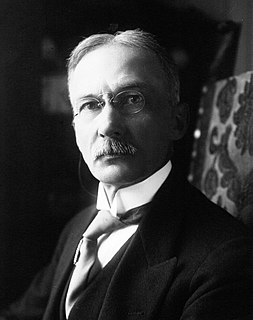A Quote by James Mark Baldwin
Plato stands for the union of truth and goodness in the supreme idea of God.
Related Quotes
In the most general terms, the Enlightenment goes back to Plato's belief that truth and beauty and goodness are connected; that truth and beauty, disseminated widely, will sooner or later lead to goodness. (While we're making at effort at truth and goodness, beauty reminds us what we're hold out for.)
God who is goodness and truth is also beauty. It is this innate human and divine longing, found in the company of goodness and truth, that is able to recognize and leap up at beauty and rejoice and know that all is beautiful, that there is not one speck of beauty under the sun that does not mirror back the beauty of God.
God has no needs. Human love, as Plato teaches us, is the child of Poverty – of want or lack; it is caused by a real or supposed goal in its beloved which the lover needs and desires. But God's love, far from being caused by goodness in the object, causes all the goodness which the object has, loving it first into existence, and then into real, though derivative, lovability. God is Goodness. He can give good, but cannot need or get it. In that sense , His love is, as it were, bottomlessly selfless by very definition; it has everything to give, and nothing to receive.
Through Plato, Aristotle came to believe in God; but Plato never attempted to prove His reality. Aristotle had to do so. Plato contemplated Him; Aristotle produced arguments to demonstrate Him. Plato never defined Him; but Aristotle thought God through logically, and concluded with entire satisfaction to himself that He was the Unmoved Mover.
What is sin? It is the glory of God not honored. The holiness of God not reverenced. The greatness of God not admired. The power of God not praised. The truth of God not sought. The wisdom of God not esteemed. The beauty of God not treasured. The goodness of God not savored. The faithfulness of God not trusted. The commandments of God not obeyed. The justice of God not respected. The wrath of God not feared. The grace of God not cherished. The presence of God not prized. The person of God not loved. That is sin.
When we assume God to be a guiding principle well, sure enough, a god is usually characteristic of a certain system of thought or morality. For instance, take the Christian God, the summum bonum: God is love, love being the highest moral principle; and God is spirit, the spirit being the supreme idea of meaning. All our Christian moral concepts derive from such assumptions, and the supreme essence of all of them is what we call God.
The idea that a reporter has to be 'fair and balanced' is ridiculous. The fact is, the truth usually is not fair and it's not balanced. Truth stands by itself. And the idea that something called fair and balanced is a substitute for truth and fact is mindless nonsense that has captured much of the national media.
The closer we are to God, to divine attributes - such as absolute truth, goodness, and beauty - the more we wonder. When we separate ourselves from truth, goodness, and beauty, we lose wonder and become cynical. The Enlightenment was basically the narrowing of our vision to a purely scientific, empirical, rationalistic worldview, screwing down the manhole covers on us so we became squinting underground creatures.
The notion that the Supreme Court comes up with the ruling and that automatically subjects the two other branches to following it defies everything there is about the three equal branches of government. The Supreme Court is not the supreme branch. And for God's sake, it isn't the Supreme Being. It is the Supreme Court.








































